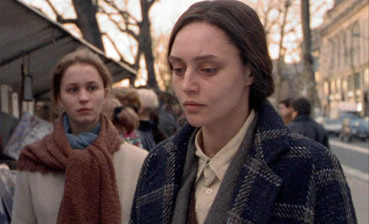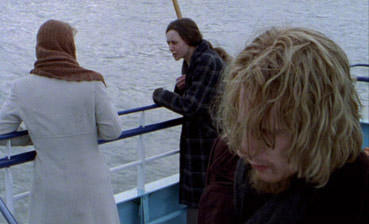|
Word
has it that some of the more unsympathetic critical reception
to Leos Carax's 1991 Les Amants du Pont-Neuf was at least
partly responsible for the director's eight-year break from
feature film directing. It's certainly a film that split
opinion. I first sought it out specifically because people
I knew kept telling me how good it was and never quite understood
the hostility some still harbour towards it. Carax's fourth
feature, Pola X, was thus a long time coming,
and it was some time after its original release that I finally
caught up with it. Having appreciated and even admired this singular director's previous work, I was looking forward to Pola X,
despite the critical mauling it suffered in some
quarters and the oft-repeated assurance that it was not like his
other films. Carax had already demonstrated that he was a filmmaker
of considerable talent, and a change of direction might not
be a bad thing at all.
The
film arrived on UK shores with the word 'controversial'
already sewn on. It's a term I always have trouble taking
too seriously. Controversial by whose standards? As it happens,
I had little trouble seeing why the label was applied here, but
time and subsequent films have taken the edge of Pola
X's ability to shock.
It's certainly not one for the casual or sensitive viewer,
but is also a well made and single-minded piece of work, littered
with the sort of inventive touches I've come to expect from
Carax. But it's also... ah, let's deal with the story first.
Adapted
from Herman Melville's 1852 novel Pierre: or, The Ambiguities
and transposed from New York to France, Pola X
(so titled as an acronym of the French title of the novel,
Pierre ou les ambiguities, with the X representing the
tenth draft of the screenplay) centres around wealthy Pierre
(Guillaume Depardieu, son of Gérard, which I'm sure
he's by now sick of people pointing out), who lives in a large
country house with his devoted mother (Catherine Deneuve,
marvellous as always), and is engaged to his equally rich
cousin Lucie (Delphine Chuillot), who resides in an equally
opulent nearby abode. Pierre is not only rich, he's a successful
writer, having penned a novel under the pseudonym Aladin
that has become a cult success in the domestic youth market.
Pierre, it seems, has it all.

One
day, he is sitting at a café with his close friend
Thibault (Laurent Lucas) when the pair notice a dark-haired
woman (Yekaterina Golubev), who appears to be spying on them.
Pierre gives chase but to no avail. Later, he encounters
her on a road at night, and when cornered she claims to be his long-lost
sister Isabelle. Pierre becomes obsessed with Isabelle's past history
and future fate, and decides to turn his back on his marriage
and wealth and live with her as brother and sister. Their
initially fruitless search for a suitable abode eventually
lands them rooms above a cavernous warehouse that is a base and
rehearsal studio for a post-industrial band who also appear
to be preparing for guerilla war. As circumstances bring
the couple closer, the nature of their relationship begins
to change.
On
its original release, Pola X was not met
with an enthusiastic response. Some of the more
negative reaction was of the sort that always makes me want
to see the film being slated, usually because there's a
snotty superiority to the writing that suggests the sort of reviewer
I'd probably set on fire if I met them at a party. But Pola
X was attracting a different sort of criticism,
a recognition of quality and almost a reluctance to admit
the failings, which were seen as considerable. Reviewers
wanted to like it, but couldn't. And you know what? I kind
of see where they're coming from.
OK, it's my personal prejudice that makes it hard for me
to feel for the woes of the insanely wealthy or frankly care
that much for them when they fall from grace, whatever the route.
Too often there's the sense that such people are thrown
into a spiral of self-disintegration, usually by a significant
but hardly earth-shattering event or revelation, simply
because they have nothing else in their lives to worry about.
So it is with Pierre, who seems primed from the start to
believe the tale that Isabelle tells, and is all too ready to
throw off the so-called trappings of privilege to find an
essential truth to life, one that will give meaning to his new-found
anxieties and perhaps inspire his writing. It could be argued
that Carax shares my cynicism here in his determination
to rub Pierre's nose in his folly, dishing out punishment
both mental and physical, in the process effecting a
transformation from rich bright young thing to shambling,
bedraggled and murderous sociopath.
We're
not invited to identify with Pierre so much as pity him,
and if much of his pain seems self-inflicted then there
is also the suggestion of predisposition to some of his
actions, his incestuous relationship with his new-found
sister signalled early on by a mother-son bond that appears
to go a little beyond the maternal. And you won't miss this
connection, as the film does tend to dress its subtext in
particularly loud colours – the rich are shown to be incestuous,
shallow, self-centred and disloyal, while the black dressed
musical revolutionaries are on hand more for their nihilistic
associations and to provide the required last act weaponry than for any
narrative logic. This shout from the rear is
completed when the desperate Pierre is forced to reveal
his identity as the man behind the Aladin enigma, the destruction
of his artistic façade accelerating his downward
plunge.

Inevitable and increasingly downbeat, something I personally
don't have a problem with, the film's continued status as a controversial
work stems less from its brother-sister incest story or
its explicit sex (neither were exactly making their film
debut here) than the combination of the two, resulting in
a passionate, done-for-real sex scene whose troubling undertones
strip it of the eroticism it might otherwise have had. Which
is clearly the point, of course. There's no doubt that Carax is pushing
some of the right buttons here, but Pierre's
descent into nihilism is something I found myself observing
rather than understanding or emotionally engaging with.
This disengagement is enhanced in the later stages by some sizeable
narrative jumps, the result, apparently, of Carax editing
this version down from a three-hour first cut.
And
yet, as ever with Carax, there is still much to admire here,
not least in the well judged performances, Eric Gautier's
cinematography, Scott Walker's score (yes, the
Scott Walker), and scattered moments that remind you just
how exciting a filmmaker Carax can be when he's on form:
Pierre's tumble from his motorbike; the dark woodland encounter
between Pierre and Isabelle; the beautifully executed camera
move that gives us our first view of the warehouse musicians;
Deneuve's night-time bike ride; the exhilarating tracking
shot that accompanies a fleeing Isabelle; the almighty wind
that Pierre battles through to check for mail. And despite its emotional distance, intellectually
and artistically the film exercises a peculiar if uneven
hold.
We
are left with a work that feels as troubled and perhaps
even as mixed-up as its lead character, one that is guaranteed
to piss off and/or depress a sizeable portion of its audience.
And yet for all its flaws, Pola X is still
a damned sight more interesting and imaginative than the
majority of pap you'll find decorating the DVD shelves at
Woolworths, and the sort of film that I, for one, am rather
glad is out there.
Another
fine anamorphic 1.66:1 transfer for The
Leos Carax Collection, something not always
obvious from the film's sometimes deliberately gloomy look. This is particularly evident in the night-time woodland
meeting between Pierre and Isabelle, where darkness of the
image is such that detail only just registers. Contrast,
colour and sharpness on the early daytime countryside vistas,
however, are of a high order.

As with the other films in this collection, the soundtrack
is Dolby 2.0, but this time is stereo, a decent enough track
in itself with a very reasonable tonal range and good
separation in places. However, the original soundtrack was
mixed in both 5.1 and DTS and Fox Lorber's US DVD release
includes an apparently impressive 5.1 track. There are scenes
where the surround mix and low frequency wallop of 5.1 would
definitely enhance the experience, notably the near hurricane
wind that accompanies Pierre on his mail run and the warehouse-filling
metal banging of the industrial music (which, unlike many
other reviewers, I am rather partial to).
Selected
filmographies for Guillaume Depardieu,
Catherine Deneuve and Katerina Golubeva and a brief Leos
Carax biography. Again we lose out to the US disc, which
featured a commentary by Guillaume Depardieu.
Not
an easy recommendation as a stand-alone, but a welcome inclusion
in this set, and if you don't like it – and a fair few haven't
– then at least there are two other films to take away the
pain. Personally, I think there's enough here to make it
worthwhile to anyone seriously interested in outsider cinema,
as Carax is still a director going his own way regardless,
and if he stumbles a bit en route (and he does), then let's
be grateful there's at least a few still walking that road.
Of
the three discs in Artificial Eye's Leos Carax Collection
this is the only one that disappoints in any way. The transfer
is fine and apparently considerably superior to the US Fox
Lorber release, but the lack of extras and a 5.1 soundtrack
are a bit of a let-down.
|